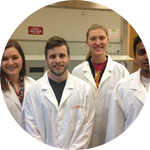About This Project
During pregnancy, placentas are extremely susceptible to various diseases and teratogens, so various medications with the ability to eradicate these problems are being tested. Current drug testing methods are considered to be unethical and unreliable, due to costs and the testing of medication on animals. Our research focuses on creating a microfluidic device that will allow us to move away from the drug testing of live subjects, and move towards a more ethical and effective method of testing.
Ask the Scientists
Join The DiscussionWhat is the context of this research?
Drug testing targeted at the placenta has lacked reliable in vitro testing designs to mimic in vivo situations. With the plethora of different birth defects occurring around the world, attention needs to be drawn to finding a potential alternative to testing live subjects. Organ-on-a-chip technology has seen a vast increase in popularity, as the understanding of utilizing the properties of microfluidics has become more prevalent. Additionally, they are cost effective, use minimal product to create, and dodge the ethical dilemma of using in vivo animal models.
What is the significance of this project?
The design of a placenta-on-a-chip will eliminate the need for testing medication on live subjects. Our innovative design will be an accurate representation a placenta during pregnancy and researchers will have the opportunity to use it for additional research in drug testing and toxicology. With the placenta-on-a-chip we will bring ourselves one step closer to the end goal of creating a body-on-a-chip, where the effect of medication can be studied on a broader scale.
What are the goals of the project?
Our goal is to create a microfluidic 3D cell culture system representing a "placenta-on-a-chip" in order to mimic the nutrient/waste transfer between maternal blood and fetal blood that occurs in the cotyledon section of the placenta, and to test and observe the effects of ethanol within the maternal bloodstream and compare it to a similar in vivo situation.
Budget
Making a significant impact in the biomedical industry with our placenta-on-a-chip is our goal. We are currently in the experimentation phase, where we are growing cells in our chip. We would like to have the opportunity to use the types of trophoblast cells that will more closely mimic a placenta during pregnancy. With this funding, we would be able to purchase these cells, and the supplies and tools used for maintaining and growing them, so that we can continue experimentation with our chip.
Meet the Team
Team Bio
Marta Sucur is an undergraduate in mechanical engineering at Iowa State University. Her interest in bioengineering began with her desire to help people and make an impact in the medical field. She became interested in Hashemi Lab due to their various research opportunities in the bioengineering field and their passion and dedication to advancing modern day technology.
Jeremy Caplin is a 2nd year M.S. student at Iowa State University. His research is in the area of organs-on-a-chip. He has recently published a review paper about organ-on-a-chip technology titled "Microfluidic Organ-on-a-Chip Technology for Advancement of Drug Development and Toxicology" in the journal Advanced Healthcare Materials. Additionally, he was awarded a 2015 NSF EAPSI fellowship to continue his organ-on-a-chip studies in South Korea during the upcoming summer months.
Rajeendra Pemathilaka is a 1st year M.S. student at Iowa State University. His research is in the area of organs-on-a-chip.
Catie Meis is an undergraduate in materials engineering with a minor in bioengineering at Iowa State University. She has been a member of Hashemi Lab for 2 years and looks forward to continuing work on interdisciplinary projects connecting engineering and medical technology.
Please feel free to contact Marta Sucur about any questions you may have!
email: msucur@iastate.edu
Press and Media
PETA:
http://www.peta.org/blog/students-organ-on-a-chip-...
Cytofluidix:
http://www.cytofluidix.com/placenta-on-a-chip-univ...
Here is the link to a review paper written by our graduate student Jeremy Caplin:
J. Caplin, N.G. Granados, M. James, R. Montazami, and N. Hashemi, "Microfluidic Organ-on-a-Chip Technology for Advancement of Drug Development and Toxicology", Advanced Healthcare Materials, DOI: 10.1002/adhm.201500040 (2015)
Project Backers
- 20Backers
- 140%Funded
- $2,100Total Donations
- $105.00Average Donation



